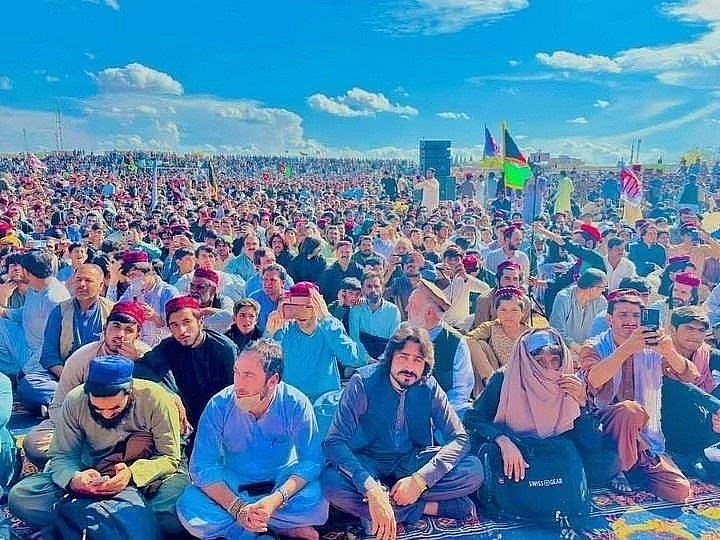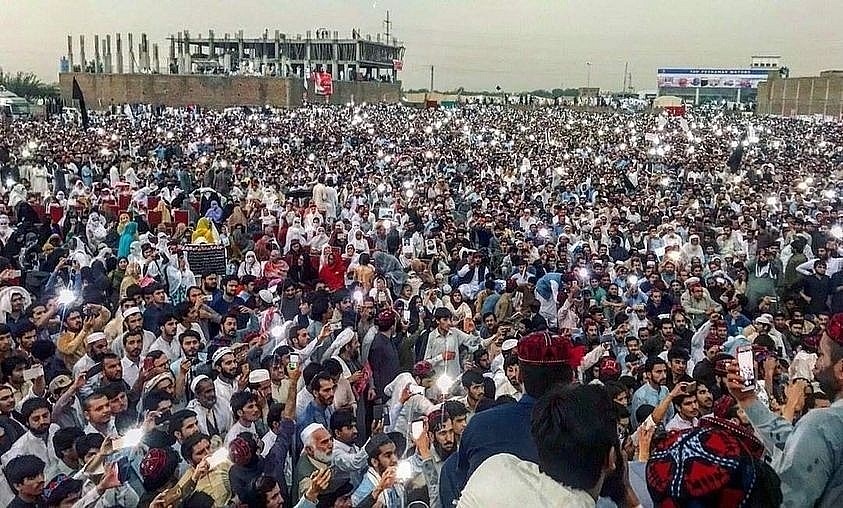The Baloch people are alienated: Today so are the Pashtuns in Pakistan
 |
If there was a moment in Pakistan’s history, when another Bangladesh could occur, it is now. The reasons for this lie in the complete and total alienation of the Pashtuns living in Pakistan. Once seen as the closest ally of Punjabis in Pakistan, the Pashtuns today face deportation and humiliation to a point of no return. The Pakistan Army which they used to serve with great pride, has become the enemy. Like the Baloch people, victims of the Army’s jackboot policy, Pashtuns are out on the streets today to protest and express their anger. No place provides greater evidence of this angst than in the border town of Chaman, where for the past six months, local Pashtuns have been sitting, in protest against Pakistan’s new policy of dividing the Pashtun community spread across the Durand Line. Is this the last straw for the creation of a Pakhtunistan or Pashtoonistan?
Recall also that the Baloch people have been the target of the Pakistani state for several decades now for seeking a more autonomous way of life. For those interested in the current situation, reference is made to the monthly report of Paank, a human rights group of the Baloch National Movement. The report outlines the various human rights abuses committed in Balochistan, including incidents of enforced disappearances, protests by families of missing Baloch individuals for their safe return, and the staged killing of two Baloch individuals previously detained in Karachi. Protests have also occurred in Pasni for Abdul Raziq; in Daki Bazar, Kech, for Shoaib Ahmed and Balach; in Jhao, Awaran, for Tahir Baloch and Zafar Akbar; and in Mastung against the enforced disappearance of Ameer Hamza, where protestors blocked the Quetta-Karachi highway.
Returning to the alienation of Pashtuns it may be mentioned that today they need to carry special travel documents to move across the border which once a free movement zone. Many Pashtuns shared their property; and families lived on both sides of the Durand Line without any problem. Trade across the border was normal. Now all that has changed permanently because the Pakistan Army and its state believe that Pashtuns can no longer be trusted and so a fence has been built all along the Durand Line in the name of security. The distrust became sharper during the recent elections in which the Army carried out a systematic campaign to oust popular leaders like Mohsin Dawar through targeted attacks and the manipulation of the poll process. Officially, the winner in the North Waziristan NA-50 constituency was Jamiat Ulema-e-Islam-Fazl (JUIF) candidate Mufti Misbahuddin. However, he was declared winner four days after the elections, a telling sign of the Army’s duplicitous games.
The PTI-backed independent candidate Aurangzeb Khan was the runner-up with 33,852 votes while Mohsin Dawar, National Democratic Movement’s candidate secured the third place with a close 32,768 votes. A firing incident occurred during a protest by NDM workers against the delay in election results in North Waziristan, resulting in the deaths of two individuals and injuries to six others, including NDM Chairman Mohsin Dawar. To ensure that the Pakistan Army’s candidate was declared winner in any case, pliable government staff were posted as presiding officers to stage-manage the results. Primary schools which were declared as polling centres, had two rooms combined as polling stations for both male and female voters. This ensured that women did not come to vote. Even where these measures failed, the polling staff were taken to the nearest Army and Frontier Corps barracks and forced to sign blank Form 45, which is the document used to officially declare the election result. There could be no better word for this than ‘rigging’.
Back in Balochistan, the March 2024 Paank report raises serious concerns about the rise in enforced disappearances and extrajudicial killings. March 2024 saw 24 cases of enforced disappearances, with 21 individuals returning home from detention. However, two men picked up by security forces in Karachi were killed in a staged encounter, and their bodies were discarded. Pakistani security forces abducted two men from Karachi’s Lyari area on 15-17 August 2023. Identified as Zaman Baloch and Shoaib Ali, they were later killed in a staged encounter near Manghopir’s Northern Bypass, falsely claimed as an armed confrontation. Paank said its workers reached out to the families of the deceased, who were assured by the Sindh Police of their return before Eid. Tragically, the families only received their bodies riddled with bullets. The report concludes that the figures on social media about Baloch missing persons and enforced disappearances only show a fraction of the reality.
It is well known that the Pakistani state has used enforced disappearances as a tool to suppress Baloch resistance. This practice has intensified over the past two decades, targeting educated Baloch youth, the Paank report said. The report also details various protests and demonstrations by families of missing persons. It recalls the case of Abdul Raziq Baloch from Surab, who was returned 16 hours after his disappearance. This happened after his family and the public blocked a highway in protest. However, Khudadad Siraj, a medical student remains missing, despite his family and peers’ protesting for his safe release. The list of those who have disappeared is never-ending and, it is likely, there will be more to come. Enforced disappearances and staged encounters exacerbated the climate of fear and terror in Balochistan.
 |
| Thousands rally in Khyber Pakhtunkhwa demanding durable peace.(Photo :facebook.com/PashtunTM) |
Families have been protesting in Kech, Gwadar, Jhaoo, Surab, and Mastung for the safe release of their relatives. Despite these protests and international condemnation from human rights groups, the Pakistani state’s stance remains unchanged, Paank observed. The unrepresented psychological and mental anguish of thousands of families affected by these disappearances remains untold. Paank highlights the plight of Baloch missing persons, and states they are subjected to long-term confinement and torture. A few are eventually released, but they often suffer from mental trauma. Pertinently, the State continues to exert control over their thought processes even after their release. Consequently, these individuals are compelled to choose between self-exile or apathy towards the suffering. It is precisely this apathy that is today the bane of the Pashtuns too.
Since the announcement of the election results in North Waziristan, protests have erupted, and in clashes with the police, two persons were killed and, six others narrowly escaped being assassinated. Blatant manipulation in the February elections was really the last straw, leaving Pashtuns angry and disheartened. Pakistan has just added a few more million disgruntled citizens on the streets in protest. Adding fuel to the fire is the plight of the Baloch people, who seem to get no respite. In a real sense, societal alienation in Pakistan has intensified with the Pashtun seeking ways to get redressal of their grievances, knowing fully well that the Pakistani state has no longer any trust in the community.
